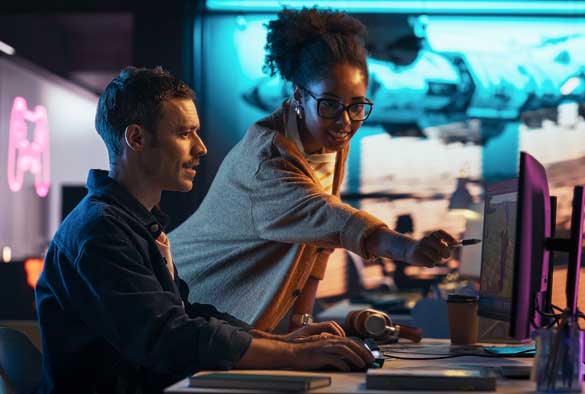Inclusive working using assistive technology
Posted on: 26 November 2024 in Community

The theme of Disability History Month 2024 is Disability, Livelihood and Employment. For our feature we are focussing on the incredible work of our own Assistive Technology Specialist, Ste Summers.
We chatted to Ste about his role and its evolution over the last 7 years.
What is assistive technology?
The term assistive technology is used to describe products or systems which assist individuals with disabilities, restricted mobility or other impairments to perform functions which may otherwise be difficult or impossible.
What support do you provide to our staff and students?
I am responsible for providing assistive technology to our students. I control the software licensing and support students by providing user guides and training sessions about the hardware and applications on offer. I also work on projects across campus such as the accessible spaces in the libraries and events run by the Accessibility Events Working Group. I’m able to give advice to staff too, although any requests need to go through their line manager initially for a Display Screen Equipment (DSE) assessment.
There are so many options available now to make your digital space more accessible, from easier note-taking in lectures, customising web pages to reduce contrast, and hardware to make studying more comfortable. You can learn more about the tools available via our accessibility web pages.
How has your role and overall accessibility support changed since you began working for the University?
Numbers of students with a neurodivergent diagnosis have grown rapidly over the past few years. It’s wonderful to see more and more initiatives introduced across campus with these students in mind, such as the implementation of quiet spaces in the libraries. Making sure students are aware of the support on offer is often the most important part of ensuring that our students are given the tools they need to progress.
I’ve found people are far more knowledgeable in recent years about creating accessible digital content and it’s so good to see online spaces becoming more inclusive. Here in IT Services, accessibility is engrained in many of the job roles and projects. It’s refreshing to see accessibility at the forefront of considerations when acquiring new platforms or designing products.
What changes have you seen in the assistive technology space?
Assistive technology is a continuously growing sector, with new research published all the time. New products and services are regularly developed, many with students in mind. These tools can ensure an inclusive educational environment for all our students.
Whilst I’ve seen vast improvements in our support for disabled students under my tenure, I believe both as a department and as a university we should continue to strive to enhance and improve the inclusive experience to ensure we meet our accessibility standards. I look forward to future innovations to support users in achieving their preferences of work. I hope that a greater acceptance and understanding of accessibility is embedded not just into technology, but into wider culture.
What advice would you give to someone with barriers to work looking to enter or re-enter the workplace?
I recently organised an accessibility festival along with colleagues from the Accessibility Events Working Group. One of our sessions included a talk from Strawberry Fields Charity about their Steps to Work Programme. This is a fantastic opportunity for individuals with barriers to work to receive advice, support, and opportunities to help them step into work. The session we ran was aimed at students who are looking to make a start in their chosen careers but there are also options available to those looking to re-enter the workplace or volunteer. I’d recommend reaching out to Strawberry Fields if you think you’d find their services useful.
I am part of the Accessibility Events Working Group who run events on campus open to staff and students. The purpose of these events is to advocate for accessibility and build networks across our staff and student communities. Many sessions have included external speakers from software companies and local charities. If you have any ideas for future events or would like to reach out to the team for any reason, you can email us at accessibilityevent@liverpool.ac.uk.
Could you benefit from our services?
Students can contact our Assistive Technology Specialist today for advice and guidance on hardware and software tools available to aid in their studies. The Disability Coaches are also a great resource for other queries relating to University life.
Staff will need to consult their line manager and complete a DSE assessment to gain access to the tools referenced on our accessibility web pages.